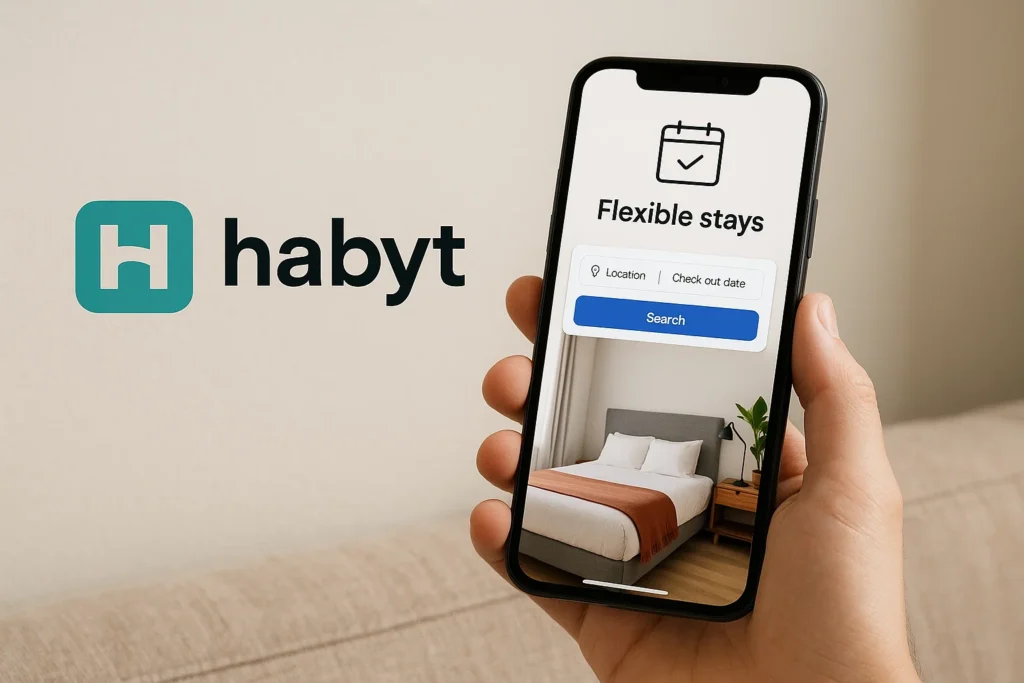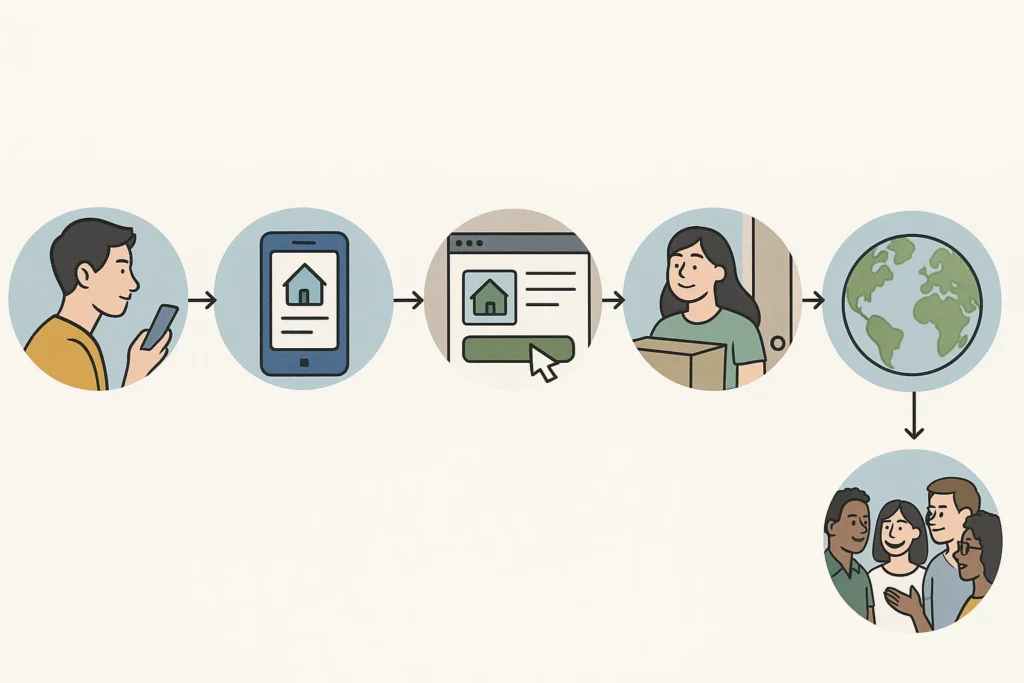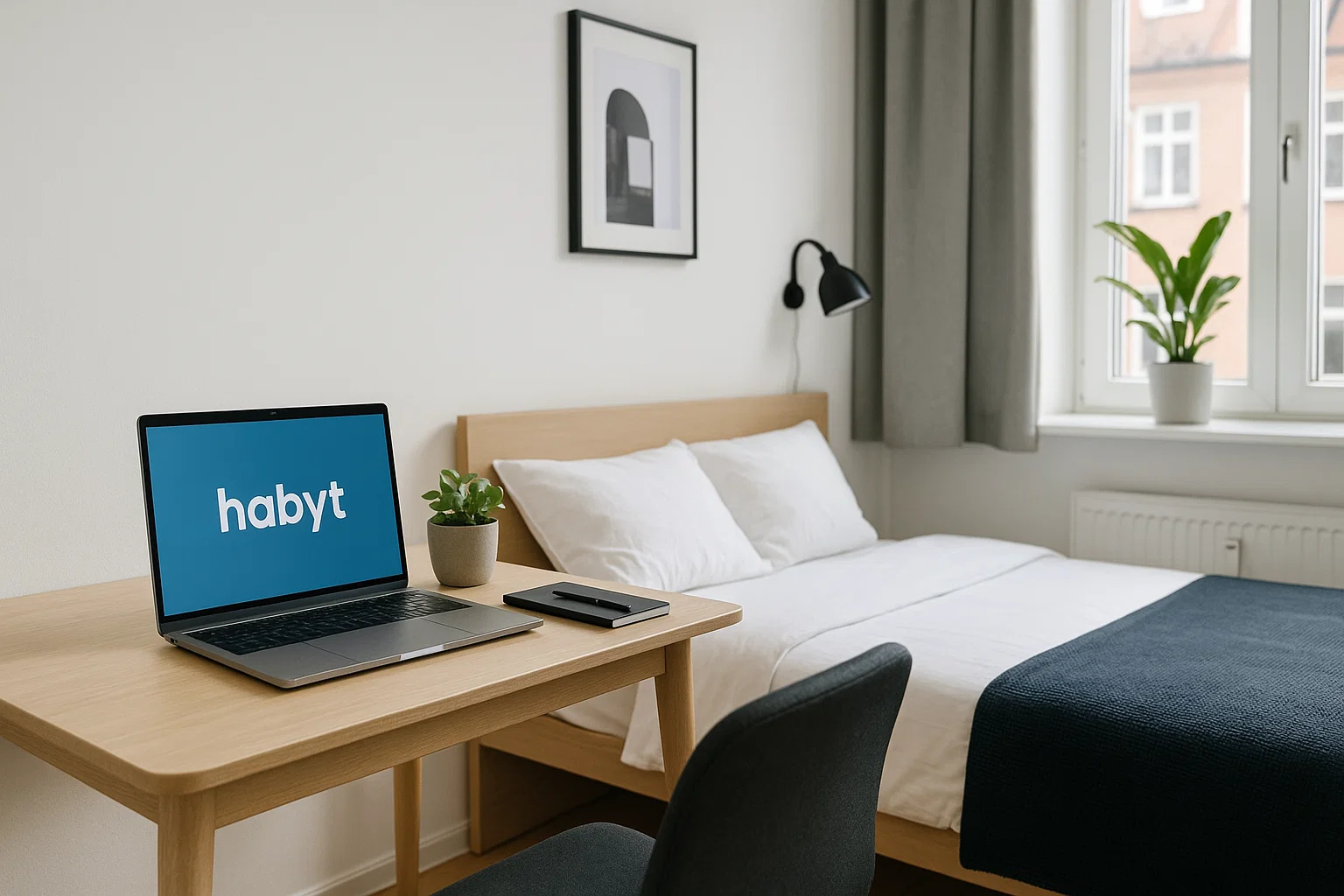Imagine moving to a new city for work or study — you want an apartment that’s furnished, flexible, and community-driven. You don’t want year-long leases, hefty deposits, or endless paperwork. That’s where Habyt comes in — offering ready-to-live homes, flexible contracts, and a connected global community for modern nomads, students, and professionals.
Brief Origin Story & Current Impact
Habyt was founded in Berlin in 2017 by Luca Bovone, starting as a co-living startup offering fully furnished, all-inclusive housing. Over the years, it expanded across Europe, Asia, and North America through strategic acquisitions (like Common and Hmlet) to become the largest global flexible housing provider, managing 30,000+ units across 50+ cities by 2025.
Its mission: make housing simple, global, and community-oriented. Habyt blends technology, design, and operations to let anyone “live anywhere” — from co-living rooms to private apartments, all managed via one app and one contract.
What Readers Will Learn
By the end of this guide, you’ll understand:
- What Habyt is and who it serves
- How its co-living and flexible housing model works
- Its revenue streams and business structure
- The tech behind its seamless global operations
- The features that set it apart in 2025
- Why it’s inspiring entrepreneurs to build similar platforms — and how Miracuves can help you create your own Habyt-like solution
What is Habyt ?
Habyt is a global flexible housing platform that provides fully furnished, ready-to-move-in rooms and apartments with flexible lease terms — all bookable online and manageable through a single app. It bridges the gap between co-living, serviced apartments, and long-term rentals, making relocation or city living hassle-free.

Core problem it solves
Traditional rentals are rigid — long leases, deposits, hidden costs, and fragmented processes. Habyt solves this by offering flexible, digital-first housing: one contract, one payment (covering rent, utilities, Wi-Fi, cleaning), and no headaches. It makes it easy for people who move often — remote workers, expats, students — to find quality housing fast.
Target users and use cases
- Digital nomads who want short-to-medium term stays with flexibility.
- Young professionals relocating for work or internships.
- Students seeking furnished, social living environments.
- Expats or remote workers needing temporary housing.
- Corporates looking for employee accommodation solutions.
Use cases:
- Renting a co-living room for 3–6 months.
- Upgrading to a private apartment in another city via the same app.
- Corporate leasing for teams relocating temporarily.
Current market position (2025)
- Units under management: 30,000+ across 50+ cities.
- Regions covered: Europe, North America, and Asia-Pacific.
- Recent mergers: Acquired Common (U.S.) and Hmlet (Asia) to become the largest global flexible housing operator.
- Funding: Raised over $50 million, backed by investors like Burda Principal Investments.
- Reputation: Leading global player redefining urban living through flexibility and community.
Why it became successful
- Flexible terms: Stay for a few months or years.
- All-in-one pricing: No hidden fees, no utilities setup.
- Global mobility: Move between cities seamlessly under one brand.
- Tech integration: End-to-end digital onboarding, payments, and support.
- Community focus: Co-living encourages social connection and networking.
Read More :- Most Profitable Furnished Apartment Rentals Apps to Launch in 2025
How Does Habyt Work ? Step-by-Step Breakdown
For Residents / Users
1. Account Creation & Onboarding
- Users sign up on the Habyt website or mobile app, browse rooms or apartments, and filter by city, duration, or room type.
- They upload ID documents and complete a digital application with basic background verification.
- Once approved, they can sign leases online — no in-person paperwork.
2. Main Features Walkthrough & User Journey
Let’s follow a typical Habyt user journey:
- Browse & Book
- The user chooses a co-living room or private studio.
- Transparent pricing shows total monthly cost (rent + utilities + Wi-Fi).
- Book instantly or request a virtual tour.
- Move-In
- Rooms are fully furnished and move-in ready.
- Flexible lease durations (from 3 months to multiple years).
- Community & Events
- Access community spaces, co-working lounges, and local events via the app.
- Meet residents with shared interests.
- Manage Everything in-App
- Pay rent, request maintenance, extend stay, or change location.
- 24/7 support available in multiple languages.
- Move Across Cities
- Existing users can relocate to another Habyt city seamlessly.
- The same profile and payment details transfer automatically.
3. Benefits to Users
- No broker hassles or long-term commitments.
- One monthly bill covers everything.
- Instant move-in and relocation flexibility.
- A social, global community — perfect for digital nomads.
For Property Owners / Partners
- Onboarding: Landlords and building owners list their units through Habyt’s partner program.
- Habyt standardizes: The company may furnish, brand, and manage operations on behalf of owners.
- Revenue model: Owners earn steady rental income; Habyt handles marketing, tenants, and support.
Partner benefits:
- Access to a global tenant base.
- Professional property management.
- Higher occupancy due to flexible stays.
Technical Overview (Simple Explanation)
- Platform: Habyt operates as a SaaS-enabled marketplace, connecting landlords, residents, and service providers.
- Core layers:
- Front-end app: User interface for browsing, booking, and managing stays.
- Backend CMS: Manages listings, pricing, lease terms, and user data.
- Payments & contracts: Integrated payment gateways and e-signature tools.
- Analytics: Demand forecasting, occupancy tracking, and pricing optimization.
- AI components:
- Smart matching of listings to user preferences.
- Dynamic pricing based on market demand and availability.
- Fraud prevention for tenant screening.
- Integrations: Payment gateways (Stripe, Adyen), CRM, marketing tools, and property management APIs.
Read Also :- How to Market a Furnished Apartment Rentals App Successfully After Launch
Habyt’s Business Model Explained
How Habyt Makes Money (Revenue Streams)
Habyt’s business model blends SaaS-enabled marketplace economics with real estate operations. Its revenue comes from multiple sources:
| Revenue Stream | Description | Example |
|---|---|---|
| Rental Income (Core) | Habyt earns revenue by subletting furnished units to tenants at a markup from landlord lease rates. | Habyt rents a building at €800/unit, relets at €1,000. |
| Property Management Fees | For partner properties, Habyt charges owners management and service fees. | 10–20% of gross monthly rent. |
| Membership & Service Fees | Community services, cleaning, and utilities are bundled into a monthly service fee. | Included in “one monthly bill.” |
| Corporate Housing Solutions | Offers relocation housing for companies. | B2B bulk contracts for employee stays. |
| Ancillary Revenue | Upsells like extra cleaning, coworking access, or events. | Optional add-ons in the app. |
| Technology Licensing | Provides its digital platform to regional partners under SaaS or white-label agreements. | Expansion strategy in new markets. |
Pricing Structure (2025 Snapshot)
- Room rentals: Starting €800–€1,500/month in Europe, $1,200–$2,500 in the U.S.
- Lease terms: 3–12 months standard; extendable or transferable.
- Corporate rates: Negotiated per client (often discounted for volume).
- Deposit: Minimal or none for verified users (depending on local laws).
- One-bill model: Covers rent, Wi-Fi, utilities, and maintenance — simplifying the user experience.
Commission & Fee Breakdown
| Type | Party | Rate | Description |
|---|---|---|---|
| Management Fee | Landlords | 10–20% | For operational support |
| Service Fee | Tenants | Built-in | Covers utilities & maintenance |
| Corporate Discount Margin | B2B | Variable | Volume-based bulk pricing |
| Tech Licensing Fee | Partners | SaaS | For using Habyt’s white-label platform |
Market Size & Growth Statistics
- Global flexible housing market is projected to exceed $80B by 2030, growing ~12% CAGR.
- Co-living market alone is expected to surpass $25B by 2027.
- Habyt’s 2025 footprint: 30,000+ units, 50+ cities across 3 continents.
- Competitors include The Collective, Outpost, and Common — but Habyt’s global reach is unmatched.
Profit Margins Insights
- Gross margins estimated around 20–25%, driven by markups and management efficiencies.
- High occupancy (80–95%) helps sustain profitability.
- Centralized operations and tech automation reduce overhead.
- Scale advantages from global expansion improve margin leverage.
Key takeaway: Habyt thrives by combining hospitality simplicity with real-estate economics — a hybrid of Airbnb flexibility + property management stability.
Key Features That Make Habyt Successful
1. Flexible Lease Terms
- Why it matters: Traditional rentals tie tenants to long commitments.
- Benefit: Users can stay from 3 months to multiple years and extend or relocate easily.
- Innovation: Smart contract system allows quick digital renewals.
2. Fully Furnished, Move-In Ready Homes
- Why it matters: Furnishing and setup costs are major relocation pain points.
- Benefit: Every Habyt room or apartment comes ready — furniture, Wi-Fi, utilities, cleaning.
3. All-Inclusive Billing
- Why it matters: Renters hate managing separate bills.
- Benefit: One monthly payment covers everything — rent, utilities, Wi-Fi, cleaning, community fees.
4. Global Mobility
- Why it matters: Digital nomads and expats move often.
- Benefit: Habyt members can transfer across cities under one account and contract — making moving countries seamless.
5. Community & Co-Living Design
- Why it matters: Urban renters seek connection, not isolation.
- Benefit: Shared kitchens, coworking zones, and local events build community.
- Tech link: The Habyt app notifies residents about events and new connections nearby.
6. Seamless Digital Experience
- Why it matters: Users expect frictionless onboarding.
- Benefit: End-to-end process — from booking to payment to support — is digital.
- Feature set: Mobile-first booking, online signatures, automated support chat.
7. Smart Pricing Engine
- Why it matters: Rent demand fluctuates daily.
- Benefit: AI-powered pricing adjusts rates based on demand, city, and duration.
- Outcome: Maximized occupancy and revenue stability.
8. Corporate Housing Integration
- Why it matters: Companies need turnkey employee housing.
- Benefit: Habyt offers B2B bulk bookings with flexible terms and single invoicing.
9. AI-Driven Support & Automation
- Why it matters: Managing 30,000 units needs smart systems.
- Benefit: AI triages maintenance tickets, routes service requests, and handles multilingual support.
10. Sustainable & Smart Design
- Why it matters: Renters prefer eco-friendly living.
- Benefit: Energy-efficient appliances, shared resources, and sustainable materials reduce costs and carbon footprint.
2025 Feature Updates
- Smart relocation tool: Suggests best-fit apartments across cities based on habits and preferences.
- Dynamic roommate matching: Uses AI for compatibility scoring in co-living setups.
- Self check-in with smart locks: Rollout across Europe and Asia-Pacific.

Why these features matter:
Habyt’s mix of tech, design, and community makes it the go-to brand for flexible living. In 2025, its focus on AI, automation, and cross-border living sets it apart from traditional landlords or serviced apartments.
The Technology Behind Habyt
Tech Stack Overview (Simplified)
Habyt’s platform combines proptech, hospitality tech, and AI-powered automation. While its full stack is proprietary, public sources and industry patterns suggest it uses:
- Frontend: React.js / Next.js for responsive web and mobile experiences.
- Backend: Node.js and Python (Django/FastAPI) to handle APIs, bookings, and automation workflows.
- Database: PostgreSQL for structured data (listings, leases) + MongoDB/Redis for dynamic search and caching.
- Hosting: AWS / Google Cloud for scalability and global redundancy.
- Payments: Stripe / Adyen integration for seamless multi-currency billing.
- AI Layer: Machine learning models for demand prediction, price optimization, and tenant matching.
Real-Time Features
- Dynamic Pricing Engine — adjusts rates based on demand, location, and stay duration.
- Smart Relocation — instantly recommends equivalent apartments when a user moves cities.
- Instant Maintenance Tracking — service requests trigger real-time notifications to operations teams.
- Multilingual AI Support Chat — 24/7 virtual assistant resolving common issues.
Data Handling & Privacy
- Encryption: TLS 1.3 for all data in transit, AES-256 at rest.
- GDPR-compliant: Since headquartered in Europe, user data is processed under EU privacy laws.
- Access Control: Role-based permissions for staff, partners, and residents.
- Tenant Screening: Uses encrypted APIs to run background checks and verify identities securely.
Scalability Approach
- Cloud-native architecture: Auto-scaling based on booking volume or user load.
- Global CDN: Ensures fast response across continents.
- Microservices pattern: Independent modules (booking, billing, messaging) allow rapid updates.
- Monitoring tools: Prometheus + Grafana for uptime and usage analytics.
Mobile App vs Web Platform
- Mobile App: Focused on renters — booking, payments, community, and support.
- Web Platform: Full functionality for landlords, corporate clients, and operations teams.
- Sync via REST APIs: Both layers connect to the same backend, ensuring real-time updates.
API Integrations
- Payment gateways (Stripe, Adyen) for recurring billing.
- CRM tools (HubSpot / Salesforce) for lead management.
- IoT & Smart Locks (Nuki, TTLock) for keyless entry.
- Property Management Systems (Yardi / custom PMS) for owner-side integration.
- Analytics APIs for occupancy tracking and revenue forecasting.
Why This Tech Matters for Business
- Scalability: Handles 30,000+ units across continents efficiently.
- Automation: Minimizes manual management, enabling lean operations.
- Personalization: AI recommendations improve user retention and satisfaction.
- Reliability: Cloud infrastructure ensures uptime and seamless relocations.
- Compliance: GDPR readiness and secure data handling build trust globally.
Habyt isn’t just a rental app — it’s a technology company that happens to manage housing. Its proptech backbone enables the seamless lifestyle experience renters expect in 2025.
Habyt’s Impact & Market Opportunity
Industry Disruption
Habyt has reshaped how people think about renting. Instead of long-term leases and rigid contracts, it introduced a membership-style housing model, similar to how Netflix redefined media access.
It disrupted both traditional landlords and short-stay platforms like Airbnb by offering a mid-term, community-driven, tech-enabled alternative — ideal for modern lifestyles that blend work, travel, and flexibility.
Market Statistics (2025 Snapshot)
- Units managed: 30,000+ across 50+ global cities.
- Regions active: Europe, Asia-Pacific, and North America.
- Funding: Raised $50M+ to date; continuing Series C expansion into new continents.
- Growth: Post-Common merger, unit count tripled between 2022–2025.
- Market leadership: The largest global flexible living provider, surpassing other co-living startups.
The global co-living market is valued at $15B in 2025, expected to reach $30B+ by 2030 (CAGR ~12%). Meanwhile, flexible rentals — combining long- and short-term stays — are forecast to cross $80B globally by 2030.
User Demographics & Behavior
- Age group: 22–40 (millennials, Gen Z professionals).
- Profile: Digital nomads, remote workers, students, young professionals.
- Behavioral trend:
- Value flexibility over ownership.
- Prefer community and social living to isolation.
- Seek plug-and-play homes that simplify relocation.
- Corporate demand: Enterprises increasingly use Habyt for temporary staff housing or relocation.
Geographic Presence
- Europe: Berlin, Madrid, Paris, Lisbon, Amsterdam, Milan.
- Asia-Pacific: Singapore, Hong Kong, Tokyo, Sydney.
- North America: New York, San Francisco, Austin, Toronto.
- Growing into LATAM (São Paulo, Mexico City) through 2025 expansions.
Future Projections
- Market driver: Rising global mobility — 35% of professionals plan to live in multiple cities over 5 years (Habyt 2025 Report).
- Tech shift: AI, IoT, and automation making property operations leaner and more sustainable.
- Hybrid living trend: Work-from-anywhere lifestyles boosting long-stay demand outside traditional leases.
- Institutional interest: Real estate funds investing in co-living portfolios for recurring yield.
Opportunities for Entrepreneurs
- Regional clones — build local versions targeting under-served cities or countries.
- Vertical niches — student housing, digital nomad hubs, senior co-living, or women-only communities.
- Proptech SaaS — white-label flexible rental systems for landlords or agencies.
- AI-enabled tools — rent prediction, smart maintenance, or roommate matching modules.
Natural Transition:
Habyt’s rise shows the enormous demand for tech-driven, flexible housing ecosystems. In the next section, we’ll break down how entrepreneurs can create their own Habyt-like platform — and how Miracuves helps bring it to life fast.
Building Your Own Habyt-Like Platform
Why Businesses Want Habyt Clones
- Proven global demand: Habyt’s 30,000+ units across continents show how strong the appetite is for flexible, furnished living.
- Changing renter mindset: Millennials and Gen Z prefer flexibility and community over ownership.
- Recurring revenue: Subscription-style housing models generate stable monthly income.
- Scalable model: Works for co-living, serviced apartments, and digital nomad hubs.
- Tech-first housing: With automation and AI, even lean startups can manage large portfolios efficiently.
Key Considerations for Development
- Define your niche — general co-living, student housing, or short-term urban stays.
- Core modules to include:
- Property listings & availability management
- Booking & contract automation
- Payment gateway & invoicing
- Tenant verification & onboarding
- Maintenance request & tracking system
- Admin dashboards for landlords
- Mobile app for residents
- Compliance: Regional rental laws, tax systems, and deposit requirements must be built-in.
- AI features: Dynamic pricing, roommate matching, and predictive maintenance boost retention.
- Scalability: Architecture should handle 100 to 10,000+ listings seamlessly.
Cost Factors & Pricing Breakdown
Habyt-Like App Development — Market Price
| Development Level | Inclusions | Estimated Market Price (USD) |
|---|---|---|
| 1. Basic Coliving / Rental MVP | Core web platform for listing shared and private rooms, location & city-based search, property detail pages, availability calendar, basic booking request flow, simple pricing, user registration & login, tenant dashboard, basic landlord/host dashboard, standard admin panel | $60,000 |
| 2. Mid-Level Flexible Housing Platform | Full booking engine with instant booking & requests, advanced search & filters, verified listings, reviews & ratings, multi-city support, host onboarding & KYC, secure payments, cancellation policies, basic subscription-style stays, richer analytics dashboard, responsive web experience | $120,000 |
| 3. Advanced Habyt-Level Coliving Ecosystem | Large-scale multi-city coliving & furnished apartment network, complex pricing rules (monthly/seasonal), subscription & membership options, corporate accounts, in-app messaging, dispute management, multi-currency & multi-language support, automation tools for operations, native mobile apps, cloud scalability | $220,000+ |
Habyt-Style Coliving Platform Development
The prices above reflect the global market cost of developing a Habyt-like flexible housing and coliving platform — typically ranging from $60,000 to over $220,000, with a delivery timeline of around 4–12 months depending on booking flows, subscription logic, payment and KYC integrations, mobile apps, and scalability requirements across multiple cities and countries.
Miracuves Pricing for a Habyt-Like Platform
Miracuves Price: Starts at $12,999
Miracuves offers a production-ready Habyt-style coliving and furnished rental platform based on its Blueground Clone . This starting price is positioned for a feature-rich, JS-based housing platform with flexible stay management, property/room listings, booking flows, tenant and owner dashboards, admin controls, and the ability to expand into subscription models, corporate stays, and multi-city operations as your business grows.
Note: This includes full non-encrypted source code (complete ownership), complete deployment support, backend & API setup, admin panel configuration, and assistance with publishing on the Google Play Store and Apple App Store—ensuring you receive a fully operational flexible housing ecosystem ready for launch and future expansion.
Delivery Timeline for a Habyt-Like Platform with Miracuves
For this Habyt-style readymade JS solution, the typical delivery timeline with Miracuves is 3–9 days, depending on:
- Scope of initial features and city coverage
- Number of payment gateways and KYC/verification providers
- Branding, UI refinements, and configuration of content and policies
- Any extra integrations or launch-specific requirements
This accelerated timeline lets you go live far faster than full custom development, so you can start onboarding tenants and property partners in days, not months.
Tech Stack
This solution is built with robust frameworks — Web using JavaScript (Node/Next.js), PostgreSQL & Apps using Flutter, optimized for performance, stability, and easy maintenance.
Other technology stacks can be discussed and arranged upon request when you contact our team, ensuring they align with your internal preferences, compliance needs, and infrastructure choices.
Essential Features to Include
| Feature | Purpose |
|---|---|
| Booking system | Instant or request-based rental confirmations |
| Contract automation | E-signature & digital leasing |
| Flexible billing | Monthly, weekly, or custom terms |
| Tenant portal | Payments, maintenance, support |
| Landlord dashboard | Analytics & revenue reports |
| AI pricing | Demand-based rent adjustments |
| Community module | Events, chats, local networking |
| Global relocation support | Seamless transfers between properties |
Interested in building your own Habyt-like platform?
Miracuves has helped 200+ entrepreneurs launch proptech, co-living, and rental platforms within 3-9 days using robust clone frameworks and end-to-end customization.
Whether you want a local co-living app or a global flexible housing marketplace, Miracuves can help you:
- Get to market faster
- Save 70% on development
- Customize features for your audience
Book a free consultation today to start building your Habyt-style success.
Read Also :- How to Develop a Furnished Apartment Rentals App in 2025
Conclusion
Habyt shows us the future of urban living — flexible, digital, and borderless. By blending property management, hospitality, and technology, it created a lifestyle brand that resonates with today’s globally mobile generation.
Its success proves a simple truth: renting doesn’t have to be rigid. Modern residents want freedom — to live anywhere, for any duration, without the burden of ownership or endless paperwork.
For entrepreneurs, this shift is a golden opportunity. The flexible housing and co-living space is still young, and localized or niche solutions can thrive by solving regional housing pain points.
With Miracuves, you don’t have to start from scratch — you can launch a Habyt-like platform with proven functionality, customizable scripts, and expert support to reach market in days, not months.
The next big name in flexible housing could be yours.
FAQs
How does Habyt make money?
Habyt earns revenue from rental markups, management fees from property owners, service bundles (utilities, cleaning, Wi-Fi), corporate housing contracts, and technology licensing to regional partners.
Is Habyt available in my country?
As of 2025, Habyt operates in Europe, Asia-Pacific, and North America, across 50+ cities. If it’s not yet in your country, you can partner or build a similar platform tailored to local markets.
How much does Habyt charge tenants?
Monthly rents vary by city and unit type — starting around €800–€1,500 in Europe or $1,200–$2,500 in the U.S. All prices include utilities, Wi-Fi, and services.
What’s Habyt’s model for landlords or property owners?
Landlords can list properties via Habyt’s partnership program. Habyt handles furnishing, marketing, and operations in exchange for a management fee (typically 10–20% of rent).
How does Habyt ensure safety and quality?
Habyt inspects every property before onboarding, uses verified partners, runs tenant identity checks, and offers 24/7 multilingual support.
Can I build something similar to Habyt?
Yes. You can create a flexible housing or co-living app with clone frameworks. Miracuves offers ready-made Habyt-style scripts and full customization to launch within 7–14 days.
What makes Habyt different from Airbnb or traditional rentals?
Unlike Airbnb, Habyt focuses on mid- to long-term stays (3–12 months) with consistent design, community living, and one-bill simplicity. It also enables global relocation between cities.
How many users or units does Habyt manage?
By 2025, Habyt manages 30,000+ units across 50+ cities, making it the largest global flexible housing platform
What technology does Habyt use?
Habyt runs on a cloud-based, AI-driven architecture — integrating booking, payments, maintenance, and pricing automation through APIs, with secure data handling and GDPR compliance.
How can I create a Habyt-like platform?
You can either build from scratch (6–9 months) or use Miracuves’ clone development, which accelerates deployment in 3-6 days. Schedule a free consultation to explore your market-fit solution.
Related Articles :-








